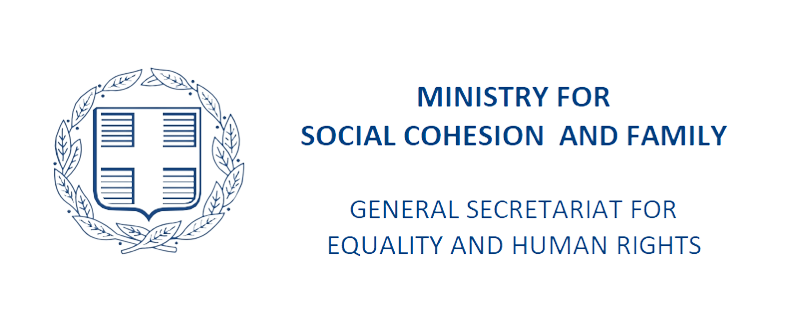Comprehensive contribution by the Greek General Secretariat for Gender Equality on women and the media in the digital era (August 2017)
The comprehensive contribution of the General Secretariat for Gender Equality (GSGE), i.e. the governmental organization in charge of equality between women and men in Greece, on women and the media in the digital era is divided into eight chapters:
a) National Action Plan on Gender Equality 2016-2020
b) synergy between the GSGE and the Hellenic Broadcasting Corporation (ERT)
c) implementation by a Greek NGO of a project on women in the mass media, co-financed by the GSGE and the European Union
d) the GSGE and the Geneva Framework on Gender and Media International Development Cooperation
e) the GSGE Observatory on Equality between Women and Men
f) cooperation between the GSGE and the National Centre for Public Administration & Local Government
g) “Women & Girls Go Digital, National Action Plan for increasing the female talent in digital jobs”
h) “Innovation and Employability for Women, E-Women”.
The relevant text follows:
A. Greece’s main priorities in the field of gender equality are reflected in the new National Action Plan on Gender Equality 2016-2020 (NAPGE), prepared by the General Secretariat for Gender Equality (GSGE), i.e. the governmental organization in charge of equality between women and men,in cooperation with other public bodies, academia and civil society and aligned with the priorities of the European Union and the United Nations on gender equality:
a) the full text in Greek: http://www.isotita.gr/ethniko-programma-drasis/
b) a simplified version in English: http://www.isotita.gr/wp-content/uploads/2017/07/Greece-National-Action-Plan-on-Gender-Equality-2016-2020.pdf .
It includes a variety of horizontal interventions in public policy and vertical specialized policies aimed at women and men in areas where inequalities are identified. It has been included as a national good practice by the European Commission at the 2017 Report on Equality between Women and Men in the EU (pages 51-52):
http://ec.europa.eu/newsroom/document.cfm?doc_id=43416 .
Furthermore, it has been uploaded on the online cooperation and consultation hub established by the European Institute for Gender Equality (EIGE), an autonomous body which operates within the framework of European Union policies and initiatives: http://eurogender.eige.europa.eu/posts/greece-national-action-plan-gender-equality-2016-2020 . To support better-informed policy-making, the EIGE contributes to the promotion of gender equality in Europe through delivering high-level expertise to the European Commission, the European Parliament, the Member States and Enlargement countries.
In particular, the priorities of the National Action Plan for Gender Equality 2016-2020 are in accordance with the guidelines of the European Commission to the 28 EU Member-States and concern the following policy areas:
1) social cohesion, poverty, immigration and multiple discrimination
2) gender-based violence
3) labour market and reconciliation of family and professional life
4) education, training, culture, sports and mass media
5) health
6) decision-making.
The issue of gender mainstreaming in journalism and the mass media has been emphatically incorporated for the period 2016-2020 through further development of synergies among competent stakeholders from the public and the private sector.
After all, the media plays a significant role in perpetuating and challenging social norms that condone discrimination or violence against women. It can objectify women but also showcase strong women leaders and protagonists who can become role models for their audience.
B. The General Secretariat for Gender Equality (GSGE) has been a member of the Council for Social Control at the Hellenic Broadcasting Corporation (ERT) aiming at gender mainstreaming in the structure and the work of the State Radio-Television. In addition, the GSGE has joined the ERT team on the European Project against hate speech in the mass media entitled “Respect Words”.
Furthermore, the GSGE participates at the Working Group set by the Ministry of Education, Research & Religious Affairs on the implementation of the Project “No Hate Speech Movement” initiated by the Council of Europe.
C. During the Programming Period 2007-2013 (extended until 31-12-2015), the GSGE subsidised the implementation of a Project on gender equality in the mass media by the Greek NGO League for Women’s Rights as a follow-up of a GSGE public call. The Project was co-funded by the General Secretariat for Gender Equality and the European Union and a manual/short guide printed in Greek on gender mainstreaming in journalism and the mass media has been one of the main outcomes of the specific Project.
D. The GSGE has widely publicised in Greece (target groups: Hellenic Parliament, Independent Authorities, Ministries, Regional and Local Authorities, mass media, Research Centres, NGOs, as well as all the key social partners) since January 2016 the Geneva Framework on Gender and Media International Development Cooperation; this initiative taken by the competent GSGE Directorate for Development & Support of Policies on Gender Equality was praised by the General Secretariat for Information & Communication on the 8thof January, 2016.
The relevant links from our website on the internet are the following:
a) detailed article in Greek: http://old.isotita.gr/index.php/news/2405;
b) article in brief on the English page of our website on the internet: http://old.isotita.gr/en/index.php/news/533
It is noted that on the 7th and the 8th of December, 2015 stakeholders including Global Alliance on Media and Gender (GAMAG) members, UN organizations, high-level government representatives, regional and international development organizations, private sector, media organizations and civil society organizations gathered at Palais des Nations in Geneva to dialogue about the necessity of international development cooperation on gender and media.
This meeting was organized by UNESCO in cooperation with the Government of Greece, GAMAG, ITU, UN Women, OHCHR and other UN organizations. Over 200 participants from 65 countries actively engaged in discussions covering subjects and challenges related to media and gender through a series of high-level plenary sessions and thematic round tables.
E. An “Observatory on Gender Equality” has been set up in the General Secretariat for Gender Equality. The Flagship Project is entitled “Service organization for the integration, monitoring and evaluation of Gender Equality Policies in all aspects of Public Sector’s Actions (Observatory)”; its aim is to support Public Administration and Local Authorities in principle to design, implement and evaluate policies concerning gender equality through detailed gender-segregated data on equality issues (statistics and surveys) deriving from the development and function of relevant tools.
The structure of the Observatory is based on the twelve critical areas of concern of the Beijing Platform for Action (BPfA), among which the one on “Women and the Media” is included.
It has to be underlined that the specific project has been selected by the European Commission as a national good practice in the Annual Report on Equality between Women and Men in the European Union 2015 (Brussels, March 2016): page 40 of the EC Report
http://ec.europa.eu/justice/gender-equality/files/annual_reports/2016_annual_report_2015_web_en.pdf .
F. Cooperation between the General Secretariat for Gender Equality, i.e. the governmental organization in charge of equality between women and men in Greece, and the National Centre for Public Administration & Local Government (EKDDA), i.e. the national strategic agent for the development of the human resources of the public administration and local government, has been set up aiming to gender mainstreaming in the curricula and the activities of the National Centre for Public Administration & Local Administration (EKDDA).
It is underlined that the General Secretariat for Information & Communication, as well as other relevant stakeholders associated with the domain of journalism and the mass media can take advantage of the programs (seminars, training courses, conferences) offered by the National Centre for Public Administration & Local Administration (relevant link from the English page of the EKDDA website on its mission:
http://www.ekdd.gr/ekdda/index.php/en/2012-06-29-09-59-33 ).
G. In the framework of the Hellenic Presidency of the Council of the European Union (January-June 2014), the General Secretariat for Gender Equality organised, in collaboration with the European Centre for Women and Technology and in cooperation with National and European Stakeholders, the Conference entitled “Women & Girls Go Digital, National Action Plan for increasing the female talent in digital jobs” (Athens, 4-4-2014).
In the context of Europe 2020 Strategy and in particular of the implementation of the Digital Agenda for Europe, the objective of the Conference has been to demonstrate the link between e-Skills, Gender Diversity and ICT as a key factor for economic growth based on the creation of digital jobs. The Conference addressed the digital skills gap and raised awareness about the added value by including female talent in digital jobs, research and innovation. Emphasis was given to the promotion of new opportunities for young digital entrepreneurs and to the challenges of the role of the media in the new digital era.
The Initiative “Women & Girls Go Digital in Greece – WGGDG” aims to increase the female talent in Digital Jobs based on the European Commission’s Initiative Grand Coalition for Digital Jobs and elaborated in collaboration with national and European stakeholders.
Positive reference to the Greek initiative is made in the 2015 Report by the European Parliament entitled “Empowering women on the Internet” (pages 16-17): http://www.europarl.europa.eu/RegData/etudes/IDAN/2015/536473/IPOL_IDA(2015)536473_EN.pdf .
Thanks to the specific Initiative, Greece won a major international award in the category of “digital opportunity”. The WITSA Global ICT Excellence Awards is a biannual event for the recognition of excellence in digital technology, established by the World Information Technology and Services Alliance. The award for the “Women and Girls Go Digital” Initiative in the category of “digital opportunity” was announced on September 30th 2014, as part of the 19th World Information Technology and Services Conference held in Mexico. The WITSA Global ICT Excellence Awards are granted to institutions and enterprises that capitalize on ICT innovation for the benefit of the public sector and the citizen, creating new opportunities for employment and sustainable development (press release in English: https://rm.coe.int/CoERMPublicCommonSearchServices/DisplayDCTMContent?documentId=09000016805969a9 ).
A very concrete positive outcome of our coalition is the fact that on the 8th of September, 2016 the General Secretariat for Gender Equality (GSGE) announced a public call for five scholarships to Greek female graduates for attending the Postgraduate Programme in Business Administration offered by the Hellenic Management Association (EEDE) in Athens: https://www.wegate.eu/public-call-five-scholarships-greek-female-graduates-attend-postgraduate-programme-business .
H. The General Secretariat for Gender Equality has been a partner of the Project entitled “Innovation and Employability for Women, E-Women” co-financed by the European Economic Area (EEA Grants 2009-2014). Its aim has been to identify the current evolution of technology in relation to women’s participation and sensitization, especially for young women, associated with ICT and employment (employment/employability and entrepreneurship). The leader of the Project has been the National Center for Scientific Research DEMOKRITOS. The Project E-Women started in January 2016 and concluded in March 2017:
http://www.iewomen.eu/1_2/ieWomen .




